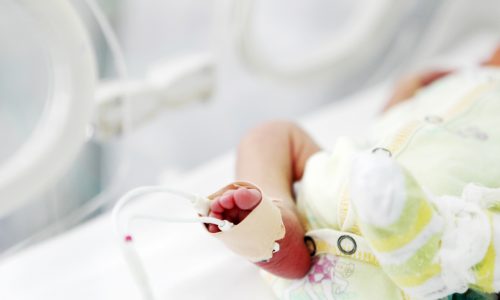Call today and speak to our specialist birth injury team. Find out if you can claim compensation.
CALL 0800 083 5500
Group B Streptococcus (GBS) is the most common cause of severe infection in newborn babies. If your child suffers due to poor care or medical negligence, then a claim for Group B Strep may be sought.

Infants with Group B Strep need a rapid diagnosis and medical intervention to ensure the best outcome, however medical negligence can arise for a number of reasons. This includes a failure to identify those at increased risk of the condition, such as mothers who have already had a baby that developed an infection. Additionally, a failure to administer antibiotics in a timely manner or a failure to monitor the baby after birth can result in negligence.
Where negligence has occurred, a claim for Group B Strep compensation may be sought.
Making a claim for Group B Strep compensation can be daunting. However, if your baby suffered adversely due to Group B Strep and you believe that negligence was a contributing factor then the advice from a specialist birth injury solicitor is imperative.
Whilst nothing can rewind the damage that has already been done, if your baby has suffered due to negligence then a birth injury claim can help fund any additional medical expenses that may be required, especially if they have now been left with a long-term disability such as cerebral palsy, deafness or blindness.
Your claim for compensation can also be important in ensuring other parents and babies do not suffer from the same negligent care that you did.
Group B Strep, also referred to as Strep B, Beta Strep or Group B Streptococcus, is a bacteria found in approximately 20-40% of women in the UK. The bacteria live in the intestines, rectum and vagina and the vast majority of women who carry the bacteria will have no symptoms and be completely unaware that they are a carrier. Group B is not a sexually transmitted disease.
Babies can therefore come into contact with Group B Strep, primarily during labour and whilst the majority will not become ill, it carries a risk that further complications can arise with life-threatening consequences.
Group B Strep can cause infections in newborn babies including sepsis (an infection of the blood), pneumonia (infection in the lungs) or meningitis (infection of the fluid and lining around the brain). These can all unfortunately be fatal for a baby.
Most babies who develop a Group B Strep infection will do so in the first few days of life. This is called early onset. However, late onset of Group B Strep infection is less common, where a baby develops this after 7 days to 3 months old.
Figures published by leading charity Group B Strep Support show that of the babies who do develop Group B Strep infection, 1 in 19 will die from an early-onset infection, and 1 in 13 will die from a late-onset infection. Of those who do survive, 1 in 14 will have a long-term disability from an early-onset infection, and 1 in 8 will following a late-onset infection.
There are a number of known factors that increase the chance of your baby developing a Group B Strep infection including:
Where there are known risk factors, such as those above, a medical professional should discuss administering antibiotics during labour. A failure to do so may result in harm occurring and an associated GBS claim.
Blackwater Law successfully represented the family of baby Blake in making a midwife negligence claim after the community midwife failed to notice a severe medical abnormality.

At present, the NHS does not routinely screen all pregnant women to establish whether they are carriers of Group B Strep. This may differ if you are undertaking private medical care for your pregnancy. There are also a number of tests available to order privately – however, if considering this, it is essential to do thorough research before ordering one.
It is believed that routine testing is not conducted as a large number of women may carry Group B Strep without their babies developing any symptoms and that testing may result in unnecessary medical intervention. It is also thought that a negative test cannot fully confirm the absence of Group B Strep.
However, you may be offered a test on the NHS if Group B Strep was detected in a previous pregnancy.
If you have ordered a private test and have tested positive, it is vital that you let your midwife know the result so that actions can be taken accordingly. In most instances, a positive test result will mean that you are offered IV antibiotics when labour starts. This has been shown to be highly effective at preventing a potential Group B Strep infection in newborn babies. However, if a midwife or medical professional fails to offer antibiotics during labour, despite a positive test, then a Group B Strep compensation claim may be sought.
If you are known to require IV antibiotics, you may also be asked to give birth in a hospital setting as it may not be possible to administer the antibiotics at home, or in some midwife-led units.
It is also likely that your baby may need additional monitoring after birth. This will include checking their heart rate, temperature, breathing and feeding. The exact amount of time that additional monitoring is required is dependent on whether antibiotics were administered at least 4 hours before giving birth. Extra monitoring can be essential in ensuring any early symptoms of an infection are picked up, without this a claim for GBS is likely if harm then arises.
The vast majority of Group B Strep infections occur in the first week of a baby’s life. However, late-onset infection can occur when a baby is between 7 days and 3 months old. Unfortunately, the administration of antibiotics during labour cannot prevent a late-onset infection and therefore an awareness of the symptoms as well as a rapid diagnosis are essential. Without a rapid diagnosis, a baby can deteriorate quickly and where negligence has occurred, a Group B Strep claim may arise.
Symptoms associated with Group B Strep are:
As specialist Group B Strep compensation lawyers, Blackwater Law understands the importance of your claim. Our medical negligence solicitors have extensive experience in advising clients concerning a wide range of birthing and maternity incidents sustained by mothers and children during pregnancy, or post labour.
Our team is accredited as one of the leading teams of medical negligence lawyers in the South East, by the Legal 500, a ranking of the UK’s top law firms.